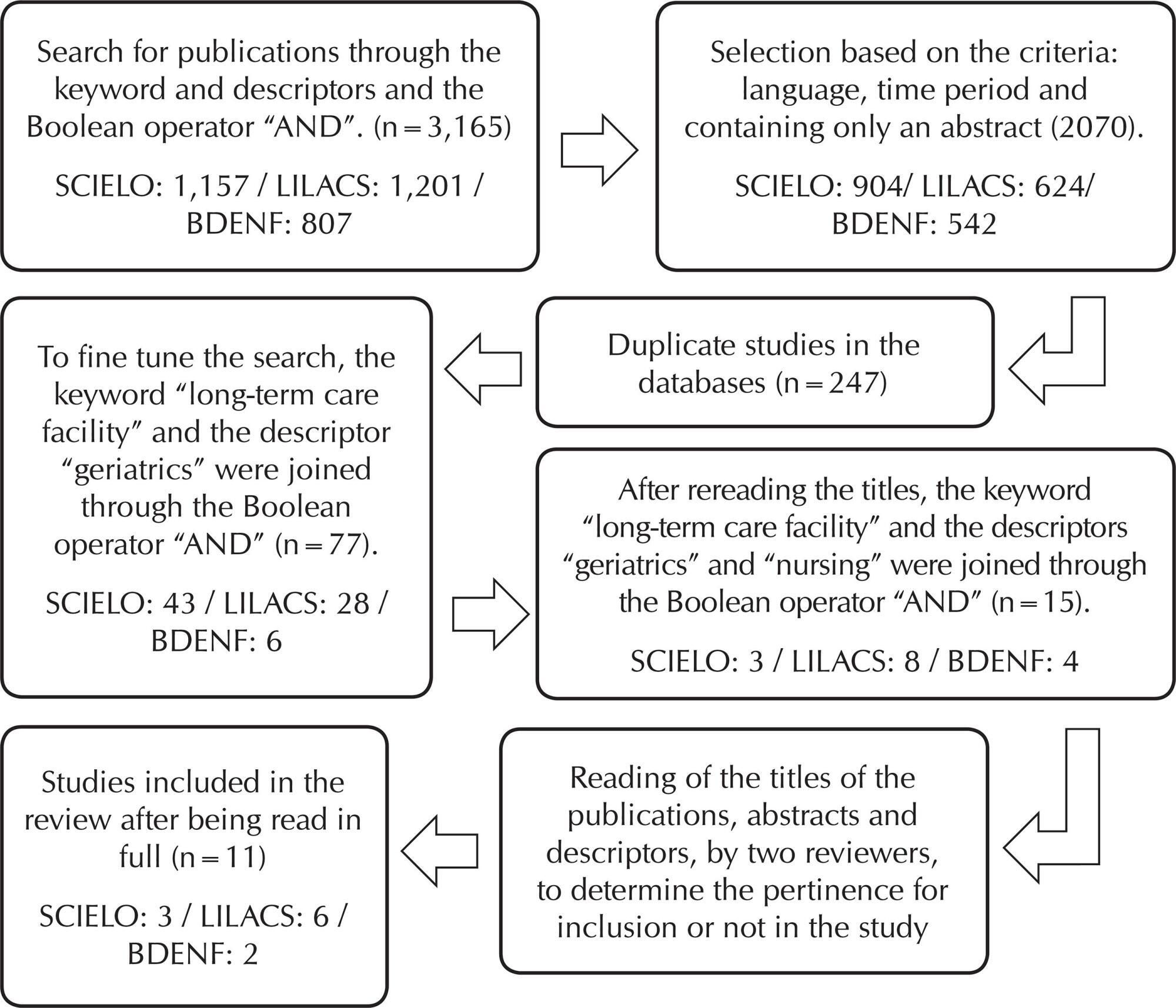-
ORIGINAL ARTICLE
Nursing Process implementation in a gerontogeriatric context: qualitative research
Revista Brasileira de Enfermagem. 2024;77(4):e20230465
09-06-2024
Resumo
ORIGINAL ARTICLENursing Process implementation in a gerontogeriatric context: qualitative research
Revista Brasileira de Enfermagem. 2024;77(4):e20230465
09-06-2024DOI 10.1590/0034-7167-2023-0465
Visualizações0Ver maisABSTRACT
Objective:
to describe Nursing Process implementation in a faith-based senior living community.
Method:
strategic action research with 19 nursing professionals and three managers of a faith-based senior living community. Implementation took place in four phases: diagnosis, planning, implementation and assessment. The data collected through semi-structured interviews and focus groups were subjected to discursive textual analysis.
Results:
the central categories were constructed: Nursing Process in faith-based senior living community: diagnosis of knowledge and application; Nursing Process in faith-based senior living community: implementation; Nursing process in faith-based senior living community: assessment after its implementation.
Conclusion:
Nursing Process implementation made it possible to structure work management/organization, contributing to knowledge, organization and continuity of care for safety and professional support.
-
ORIGINAL ARTICLE
The labor market in gerontological nursing in Brazil
Revista Brasileira de Enfermagem. 2019;72(suppl 2):97-103
12-05-2019
Resumo
ORIGINAL ARTICLEThe labor market in gerontological nursing in Brazil
Revista Brasileira de Enfermagem. 2019;72(suppl 2):97-103
12-05-2019DOI 10.1590/0034-7167-2018-0178
Visualizações0Ver maisABSTRACT
Objective:
to analyze the development of the labor market in Gerontological Nursing in Brazil, between 1970 and 1996.
Method:
a descriptive-qualitative study with a historical approach that uses the oral history of 14 research nurses working in the historical period, based on the ideas of Eliot Freidson.
Results:
Nursing overcame barriers to change the care practices to elderly people in the period described, considering the lack of a specific labor market; the need for theoretical knowledge for Gerontology care; the scarcity of research and researchers in the field; the emergence of caregivers for elderly people; the construction of multidisciplinarity and the transformation of institutions for a long-term stay.
Final considerations:
the expansion of the labor market at the time was grounded on advances on the production of knowledge of the aging process, supported by the demographic transition, that determined the increase in the demand by elderly people for health services and the enactment of specific laws protecting this population.
-
RESEARCH
Self-care of elderly people after the diagnosis of acquired immunodeficiency syndrome
Revista Brasileira de Enfermagem. 2018;71(suppl 2):793-800
01-01-2018
Resumo
RESEARCHSelf-care of elderly people after the diagnosis of acquired immunodeficiency syndrome
Revista Brasileira de Enfermagem. 2018;71(suppl 2):793-800
01-01-2018DOI 10.1590/0034-7167-2017-0248
Visualizações0Ver maisABSTRACT
Objective:
to characterize the seropositive elderly for the Human Immunodeficiency Virus and Acquired Immunodeficiency Syndrome (HIV/AIDS) in their socio-demographic aspects; to understand how the elderly take care of themselves from the diagnosis of HIV/AIDS.
Method:
Qualitative, descriptive, exploratory research conducted at a Voluntary Counseling and Testing Center with 10 elderly people receiving treatment for HIV/AIDS. The data were analyzed according to the content analysis.
Results:
Data show the elderly people’s lack of knowledge about HIV/AIDS transmission, the experience of being elderly and having HIV/AIDS, caring for oneself and life after diagnosis of HIV/AIDS in their daily lives.
Final considerations:
The diagnosis of HIV/AIDS seropositivity in the elderly generates a blend of feelings and fears that lead to food changes, adherence to treatment and the renunciation of daily and social habits, manifested as ways of self-care.
-
RESEARCH
Validity and reliability of the Brazilian version of the Caregiver Reaction Assessment
Revista Brasileira de Enfermagem. 2018;71(suppl 2):827-834
01-01-2018
Resumo
RESEARCHValidity and reliability of the Brazilian version of the Caregiver Reaction Assessment
Revista Brasileira de Enfermagem. 2018;71(suppl 2):827-834
01-01-2018DOI 10.1590/0034-7167-2017-0153
Visualizações0Ver maisABSTRACT
Objective:
To analyze the validity based on the internal structure and reliability of the Brazilian version of the Caregiver Reaction Assessment (CRA) applied to informal caregivers of dependent elderly.
Method:
A methodological study with 120 informal caregivers of the elderly. Validity based on the internal structure evaluated by exploratory factorial analysis, with extraction of main factorial axes, varimax orthogonal rotation and retention of factors by parallel analysis. Reliability assessed by Cronbach’s alpha.
Results:
The instrument revealed a factorial structure different from the original version: three factors were identified, equivalent to subscales, self-esteem, daily activities and family support, with explained variance of 42%. The values of the Cronbach alpha for the items belonging to each subscale were, respectively: 0.71, 0.81 and 0.83.
Conclusion:
The Brazilian version of CRA presents good evidence of validity based on internal structure and is reliable, and can be used to assess the overload of informal caregivers of dependent elderly.
-
REVISÃO
Gerontological contributions to the care of elderly people in long-term care facilities
Revista Brasileira de Enfermagem. 2018;71(suppl 2):912-919
01-01-2018
Resumo
REVISÃOGerontological contributions to the care of elderly people in long-term care facilities
Revista Brasileira de Enfermagem. 2018;71(suppl 2):912-919
01-01-2018DOI 10.1590/0034-7167-2017-0357
Visualizações0Ver maisABSTRACT
Objective:
To analyze Brazilian scientific productions from the last 11 years which show the contributions of nursing to elderly people in long-term care facilities.
Method:
This is an integrative literature review. The search took place in the Virtual Health Library (VHL) in the BDENF and LILACS databases and the SCIELO virtual library, between June and October 2016, using the keyword long-term care facility and the descriptors nursing and geriatrics.
Results:
Eleven studies were selected, published 2005 and 2016, with various methodological approaches that enabled discussion of the proposed objective.
Conclusion:
The contributions of nursing to institutionalized elderly people were linked to health promotion measures, as well as simple interventions, such as listening, interacting, offering recreation and helping in psychoaffective relationships. These activities contributed to raising the self-esteem of the individuals.




